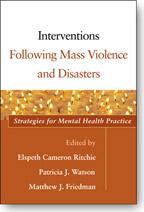 by Edited by Elspeth Cameron Ritchie, Patricia J. Watson, and Matthew J. Friedman
by Edited by Elspeth Cameron Ritchie, Patricia J. Watson, and Matthew J. Friedman
Grounded in the best science available, this essential volume presents practical guidelines for effective clinical intervention in the immediate, intermediate, and long-term aftermath of large-scale traumatic events.
Full Description:
Grounded in the best science available, this essential volume presents practical guidelines for effective clinical intervention in the immediate, intermediate, and long-term aftermath of large-scale traumatic events. Vital lessons learned from a variety of mass traumas and natural disasters are incorporated into the book's thorough review of strategies for helping specific victim and survivor populations. The editors and authors include over 40 leading experts in disaster mental health. Of crucial importance, they clearly summarize the empirical evidence supporting each intervention and provide other guidance based on experience and consensus recommendations.
"This book is a must read for practitioners who are likely to be first responders (regardless of discipline or practice focus) or minimally, service providers following a disaster, whether man-made or natural; community leaders who hold responsibility (either formal or informal) for safeguarding community members; and government officials and agencies (both public and private) to whom victims of disasters will turn immediately following such disasters. The content provided in the book provides a conceptual understanding of the disaster crisis reaction with implications for individuals, families, communities, and community agencies or infrastructures; theoretical underpinnings for disaster intervention for all of the aforementioned; intervention models that have been proven to support natural coping as well as mediate post traumatic stress disorder symptomotology; practical and doable guidelines for disaster planning for communities and agencies; and highlights how mental health professionals can utilize their expertise in consulting with agencies and communities needing assistance with disaster recovery planning. Educators, trainers, and students/trainees will find the book to be a powerhouse of information for knowledge and skill enhancement. Contributors to the book span the interdisciplinary realm, making the content appropriate for consumption and use by social workers, psychiatrists, physicians, psychologists, community organizers/activists, school teachers, social workers, staff and guidance counselors, nurses, family therapists, agency directors, etc....The information contained in the book is easy to read and understand."
-Families in Society
"A fabulous and timely addition to the psychological and behavioral health toolkit. This insightful and unique exploration of interventions after mass violence and disaster is a jewel that should be required reading for all those working in, teaching about, or preparing for work in disaster response."
-CDR Dori B. Reissman, MD, MPH, United States Public Health Service and Centers for Disease Control and Prevention
"This is absolutely the new definitive text on the acute treatment of mass trauma effects. Edited and written by leaders in the field, this volume addresses almost every conceivable aspect of mental health response to disasters and mass violence. The practical information on assessment, treatment, and training and consultation-let alone the comprehensive literature reviews-make this book a 'must have.' Highly recommended!"
-John Briere, PhD, Department of Psychiatry and Behavioral Sciences, LAC-USC Medical Center and Keck School of Medicine, University of Southern California
Pages: 430, Size: 6" x 9"
I. Introduction
1. Overview, Matthew J. Friedman, Elspeth Cameron Ritchie, and Patricia J. Watson
2. Models of Early Intervention Following Mass Violence and Other Trauma, Josef I. Ruzek
II. Preparation, Training, and Needs Assessment
3. Improving Resilience Trajectories Following Mass Violence and Disaster, Patricia J. Watson, Elspeth Cameron Ritchie, James Demer, Paul Bartone, and Betty J. Pfefferbaum
4. Disaster Mental Health Training: Guidelines, Considerations, and Recommendations, Bruce H. Young, Josef I. Ruzek, Marlene Wong, Mark S. Salzer, and April J. Naturale
5. Immediate Needs Assessment Following Catastrophic Disaster Incidents, Anthony H. Speier
III. Mental Health Interventions
6. Interventions for Traumatic Stress: Theoretical Basis, Arieh Y. Shalev
7. The Context of Providing Immediate Postevent Intervention, Roderick J. Ørner, Adrian T. Kent, Betty J. Pfefferbaum, Beverley Raphael, and Patricia J. Watson
8. The Immediate Response to Disaster: Guidelines for Adult Psychological First Aid, Bruce H. Young
9. Intermediate Interventions, Richard A. Bryant and Brett T. Litz
10. Longer-Term Mental Health Interventions for Adults Following Disasters and Mass Violence, Beverley Raphael and Sally Wooding
11. Consultation to Groups, Organizations, and Communities, James E. McCarroll and Robert J. Ursano
12. On a Road Paved with Good Intentions, You Still Need a Compass: Monitoring and Evaluating Disaster Mental Health Services, Craig S. Rosen, Helena E. Young, and Fran H. Norris
IV. Specific Situations and Populations
13. Interventions for Children and Adolescents Following Disasters, Judith A. Cohen, Anthony P. Mannarino, Laura E. Gibson, Stephen J. Cozza, Melissa J. Brymer, and Laura Murray
14. Rapid Development of Family Assistance Centers: Lessons Learned Following the September 11 Terrorist Attacks, Gregory A. Leskin, William J. Huleatt, Jack Herrmann, Lisa R. LaDue, and Fred D. Gusman
15. Psychiatric Intervention for Medical and Surgical Patients Following Traumatic Injuries, Harold J. Wain, Geoffrey G. Grammer, John Stasinos, and Catherine M. DeBoer
16. Mitigation of Psychological Effects of Weapons of Mass Destruction, Ross H. Pastel and Elspeth Cameron Ritchie
17. Promoting Disaster Recovery in Ethnic-Minority Individuals and Communities, Fran H. Norris and Margarita Alegría
18. Toward Understanding and Creating Systems of Postdisaster Care: A Case Study of New York's Response to the World Trade Center Disaster, Fran H. Norris, Jessica L. Hamblen, Patricia J. Watson, Josef I. Ruzek, Laura E. Gibson, Betty J. Pfefferbaum, Jennifer L. Price, Susan P. Stevens, Bruce H. Young, and Matthew J. Friedman
19. Outreach Strategies: An Experiential Description of the Outreach Methodologies Used in the September 11 Disaster Response in New York, April J. Naturale
V. Creating an Agenda for the Future
20. Conducting Research on Mental Health Interventions, Brett T. Litz and Laura E. Gibson
21. Mental Health and Behavioral Interventions for Victims of Disasters and Mass Violence: Caring, Planning, and Needs, Robert J. Ursano and Matthew J. Friedman
Stock: Usually ships in 8-10 business days!
|